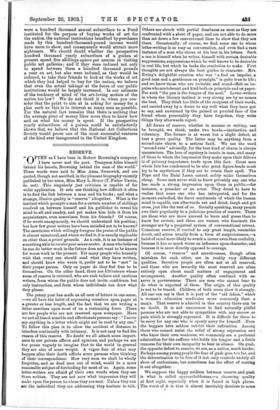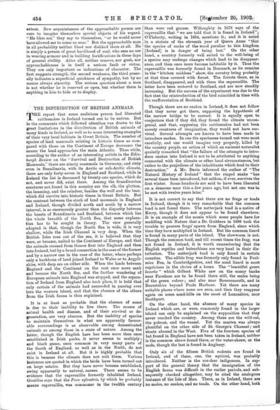RESERVE.
" OFTEN as I have been in Robert Browning's company, I have never met the poet. Tennyson hides himself
behind his laurels, Browning behind the man of the world." These words were said to Miss Anna Swanwick, and are quoted, though not ascribed, in the pleasant biography recently published by her niece, Miss Mary L. Bruce (T. Fisher Unwin, 6s. net). This singularly just criticism is capable of far wider application. It sets one thinking how difficult it often is to find the link between a man and his books ; and what a strange, illusive quality is " reserve " altogether. What is the instinct which prompts a man for a certain number of shillings resolved on between himself and his publisher to reveal his mind to all and sundry, and yet makes him hide it from his acquaintance, even sometimes from his friends ? Of course, if he wrote anonymously, we should understand his position; but how few great writers have been satisfied not to be known? The asceticism which willingly foregoes the praise of the public is almost unnatural, and where we find it, it is usually explicable on other than a priori grounds. As a rule, it is an instance of something akin to reculerpour mieux ranter. A man who believes he can do better work in the future does not want to be known for worse work in the present. Yet many people who honestly wish that every one should read what they have written, and should know who wrote it, prefer not to be " met " in their proper person. Only on paper do they feel free to be themselves. On the other hand, there are litterateurs whose sense of reserve is reversed, who are rash talkers and cautious writers, from whom the public does not invite confidence but only instruction, and from whom individuals can draw what they please.
The penny post has made us all men of letters in one sense, —we all have the habit of expressing ourselves upon paper at a greater or less length, and the fact that we are writing a letter exercises upon most of us a restraining force. There are few people who are not reserved upon notepaper. Have we not all heard sensible and affectionate persons say: "I never say anything in a letter which might not be read by any one." To follow this plan is to allow the accident of distance to interfere Continually with intimacy. It is not easy to find the , reason of this reserve. No doubt we all attach some import- ance to our private affairs and opinions, and perhaps we are too prone vaguely to imagine that to the world in general they are also of some weight. A vague fear of what may happen after their death afflicts some persons when thinking of their correspondence. How very soon we shall be wholly forgotten, and as dead men out of mind, would be a more reasonable subject of foreboding for most of us. Again, some letter-writers are afraid pf their own words when they see them written. They are not sure what impression they will make upon the person to whom they are sent. Unless they can see the individual they are addressing they hesitate to talk. Others are struck with partial dumbness as soon as they are confronted with a sheet of paper, and are not able to do more than set down a few conventional lines to show that they are there. Occasionally, of course, we find some one to whom letter-writing is as easy as conversation, and even find a rare instance of a man who shows at his best in his letters. Such a one is himself when he writes, himself with certain desirable suppressions, suppressions which he well knows to be desirable in real life, but which he lacks the resolution to make. First thoughts are not always the best guides to character. Mrs. Ewing's delightful creation who was "a fool on impulse, a good man and a gentleman on principle," is quite true to life; and we know those who are irritable and stand-offish on im- pulse who are tolerant and kind both on principle and on paper. For such "the pen is the tongue of the soul." Letter-writers in whom the literary instinct is very strong are by no means the best. They think too little of the recipient of their words, and carried away by a desire to say well what they have got to say, and unwarned by the pained or puzzled face of the friend whose personality they have forgotten, they write things they afterwards regret.
All forms of reserve, whether in manner or writing, can be brought, we think, under two heads,—instinctive and voluntary. The former is at worst but a slight defect, at best a great quality. The latter may be anything from a second-rate charm to a, serious fault. We use the word " second-rate " advisedly, for the best kind of charm is always unconscious. The love of mystery is innate in man, and many of those to whom the impression they make upon their fellows is of primary importance trade upon this fact Great men whom fate has condemned to be also great figure-heads must try to be mysterious if they are to retain their spell. The Pope and the Dalai Lama cannot safely make themselves cheap. Some men never wish to know privately any one who has made a strong impression upon them in public,—for instance, a preacher or an actor. They dread to have to realise that some one who has interpreted, and for the moment embodied, the finest sentiments of which the human mind is capable, can afterwards eat and drink, laugh and get cross, just like the rest of us. Socially speaking, many people owe their popularity to a judicious practice of reserve. There are those who are more amused to learn and guess than to know for certain, and there are women who fascinate the stronger sex by a perpetual system of conversational retreat Conscious reserve, if carried to any great length, resembles deceit, and arises usually from a form of suspicionsness,—a habit of mind more likely to wreck a career even than credulity, because it has so much worse an influence upon character, and because it is more directly opposed to courage.
Of course, " reserve " and secretiveness, though often mistaken for each other, are in reality very different qualities. Secretive people are often not at all reserved, and those who are inwardly the most reserved are often entirely open about small matters of engagement and arrangement. Another quality often confused with re- serve is perverseness. There are men who cannot bear to do what is expected of them. The origin of this quality is not to be traced. Children of both sexes show it strongly. All one can say is that it is part of the "old Adam," which a woman's education eradicates more commonly than a man's. That reserve is admired in this country there can be no doubt. It is not uncommon to find naturally pitiful persons who are not able to sympathise with any sorrow or pain which is strongly expressed. It is difficult for them to be sorry for any one who is openly sorry for himself. Even the beggars here seldom exhibit their infirmities. Among those who cannot resist the relief of strong expression and who know their own weakness, we commonly see a profound admiration for the sufferer who holds his tongue and a futile remorse for their own incapacity to bear in silence. On gush, the opposite defect to reserve, we are, as a nation, much harder. Perhaps among young people the fear of gush goes too far, and the determination to be free of it not only controls unduly all show of enthusiasm, but sometimes has the effect of rooting it out altogether.
We suppose the happy medium between reserve and gush is what is called approachableness,—a charming quality at first sight, especially when it is found in high places. The worst of it is that it almost inevitably deceives to some extent. New acquaintances of the approachable person are sure to imagine themselves special objects of his regard. "He likes me," they say to themselves, "or he would never have allowed me to come so near." But the approachable man in all probability neither liked nor disliked them at all. He is simply a person of great hardihood of soul, who sees no use in wearing.armour and in building fortifications in these days of general civility. After all, neither reserve, nor gush, nor approachableness is in itself a serious fault or virtue. They are only important as indications of character. The first suggests strength, the second weakness, the third gener- ally indicates a superficial quickness of sympathy, but by no means always sincerity. The serious question about a man is not whether he is reserved or open, but whether there is anything in him to hide or to display.















































 Previous page
Previous page